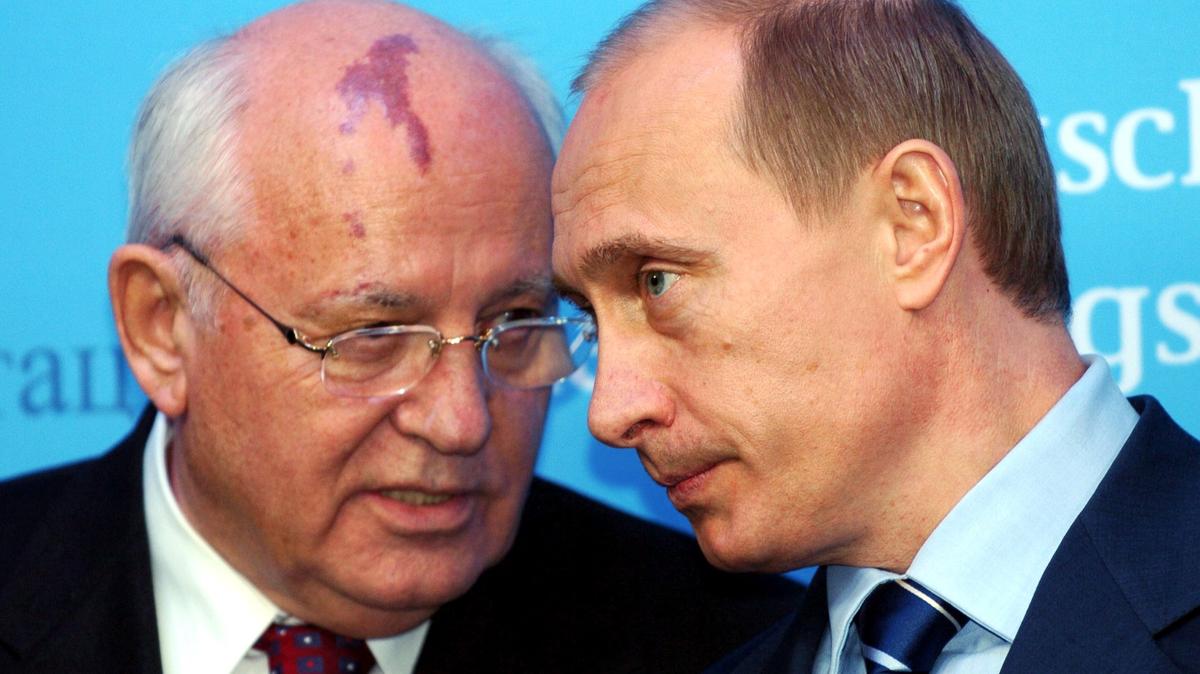Almost 40 years ago ‘perestroika’ began in the USSR. A young (by Soviet standards) and charismatic "apparatchik" Mikhail Gorbachev came to power, sincerely believing in "socialism with a human face." Back then neither he nor his entourage suspected that just six years later the Soviet Union would collapse, and Russia, after a short period of spontaneous democracy, would turn into a dictatorship and attempt to restore the empire. We spoke with Princeton University history professor Stephen Kotkin about how Gorbachev tried to lead the USSR and Russia out of the vicious circle of confrontation with the West — and how his legacy was crossed out by Vladimir Putin.
Russian authorities paid very little attention to the death of Mikhail Gorbachev, even compared to Western politicians. This seems to be due to the fact that the values that Gorbachev is associated with today are radically opposed to what the Kremlin is fighting for. Many commentators say that Putin sees himself as an anti-Gorbachev. Do you agree that these two figures are political antipodes?
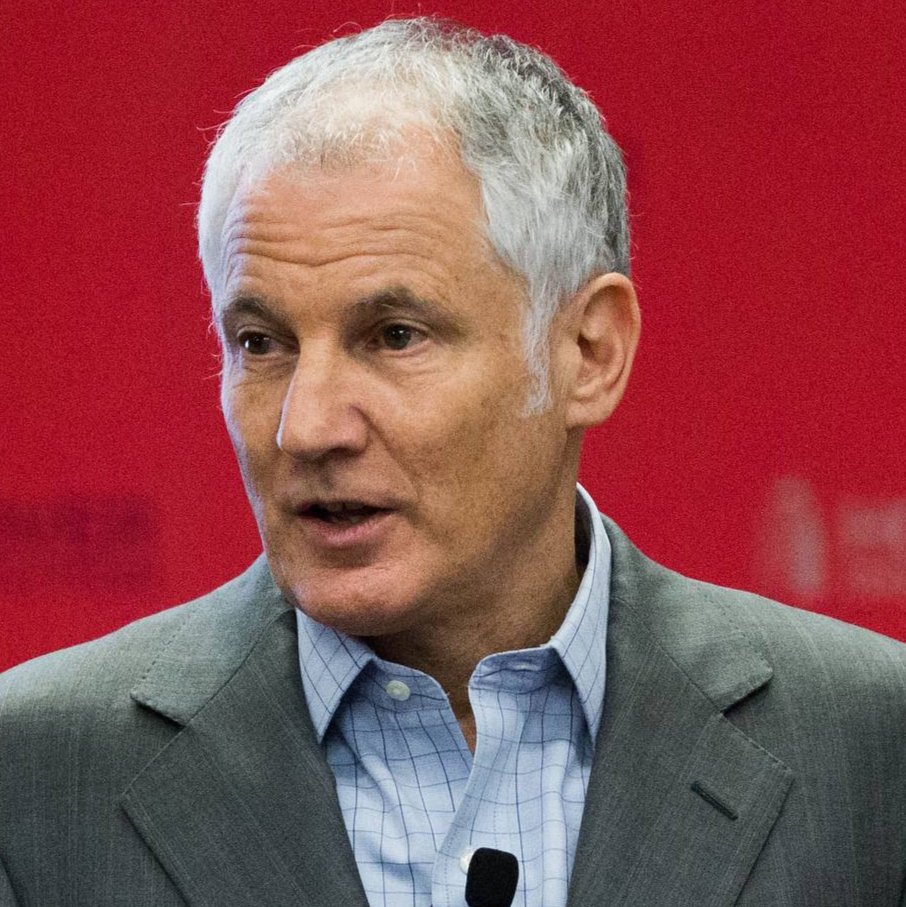
Stephen Kotkin
American historian, academic, and author
It’s humiliating and embarrassing that the Russian regime under Vladimir Putin was not able to hold a state funeral for Mikhail Gorbachev. It’s cowardly. Whether one feels that he’s a hero or a villain, whether one agrees or disagrees with the policies that he enacted. He was the first and last president of the Soviet Union. He was a historic figure, and he deserved a state funeral as a man who was in the top position of power.
But I’m not surprised by the position of the current Russian regime. I couldn’t say I’m disappointed because I know the nature of it. But I still find that it is an embarrassment for this regime to be unable to recognise a figure of such colossal, historic importance who preceded them, for better or for worse. You don’t have to agree with people when you acknowledge the role that they played in history.
I’m not sure what Putin thinks [about Gorbachev]. The regime is very narrow. We don’t have access to the main players, to the extent that there really are any main players besides a single person in this regime. So it’s very hard to tell what they think. We can only go by the actions and the actions are petty, small-minded, and confusing: he went to lay the wreath in the hospital and then he’s “too busy” to go to the state funeral. This to me is an example of confusion, not an example of a thought-through strategy.
So I think it was a missed opportunity to rise above the pettiness, at least for a moment. It’s often the case that when political figures pass away, even the opposition to their leadership shows up at the funeral. That is to say, they unite for a moment to recognise their former leader. This is typical for world practice, but evidently not typical for the Putin regime.
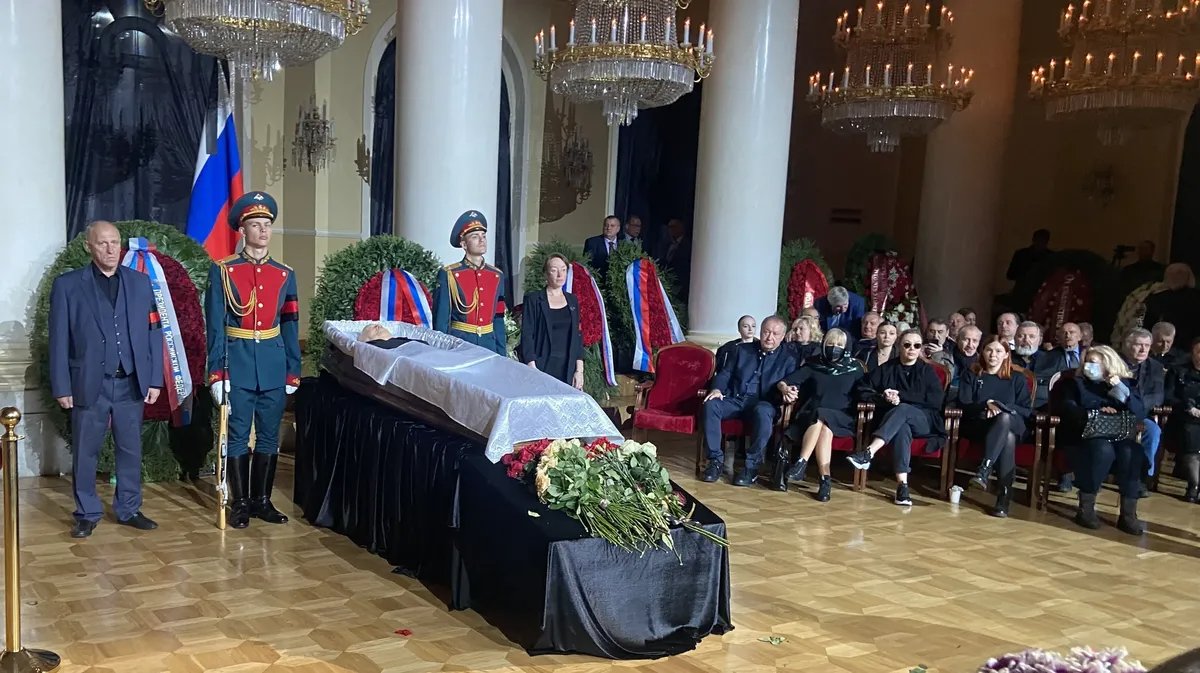
Mikhail Gorbachev`s funeral. Photo by Ilya Mastyukov, exclusively for Novaya Gazeta. Europe
Gorbachev and Putin had a lot of similarities in their biography. They were raised in the same totalitarian Soviet system, they went to law school in prestigious universities, one in Moscow, the other in St. Petersburg. They were both influenced by Soviet ideology of anti-Westernism and anti-Americanism. How come they became so different? And how did Gorbachev come to believe in democracy, rule of law and peaceful transfer of power?
You are absolutely right, they are both products of the system. I think the key difference is between the party and the state. As you know, the Soviet Union was a party state. It was a dualist structure. The Communist Party and the Soviet state existed side by side. There were multiple redundant structures, like, for example, the Council of Soviet Ministers as the government, but also the Central Committee of the Communist Party.
Gorbachev was more of a product of the party. He was more of a product of Marxism-Leninism, including a sincere adherence to a vision of Marxism-Leninism that came out of the Khrushchev period. And for Gorbachev, it was rooted in the figure of Lenin. It was a fantasy, but it was deeply held by Gorbachev that Lenin was a statesman and not a murderer, and that there was a better socialism, socialsm with a human face. Remember, Gorbachev went to law school, but he abandoned the law career after graduation. He found that the law was corrupt and that the law didn’t function the way it should, that there were bribes and corners cut and telephone calls from party officials to decide cases.
He left the law career. And instead, he became the first Communist Youth League activist. And then he became, of course, a party apparatchik. And he spent the entire rest of his life climbing the party apparatus, first in Stavropol, an agriculturally rich region, and then finally through promotion to Moscow, to the agricultural portfolio inside the Politburo in Moscow.
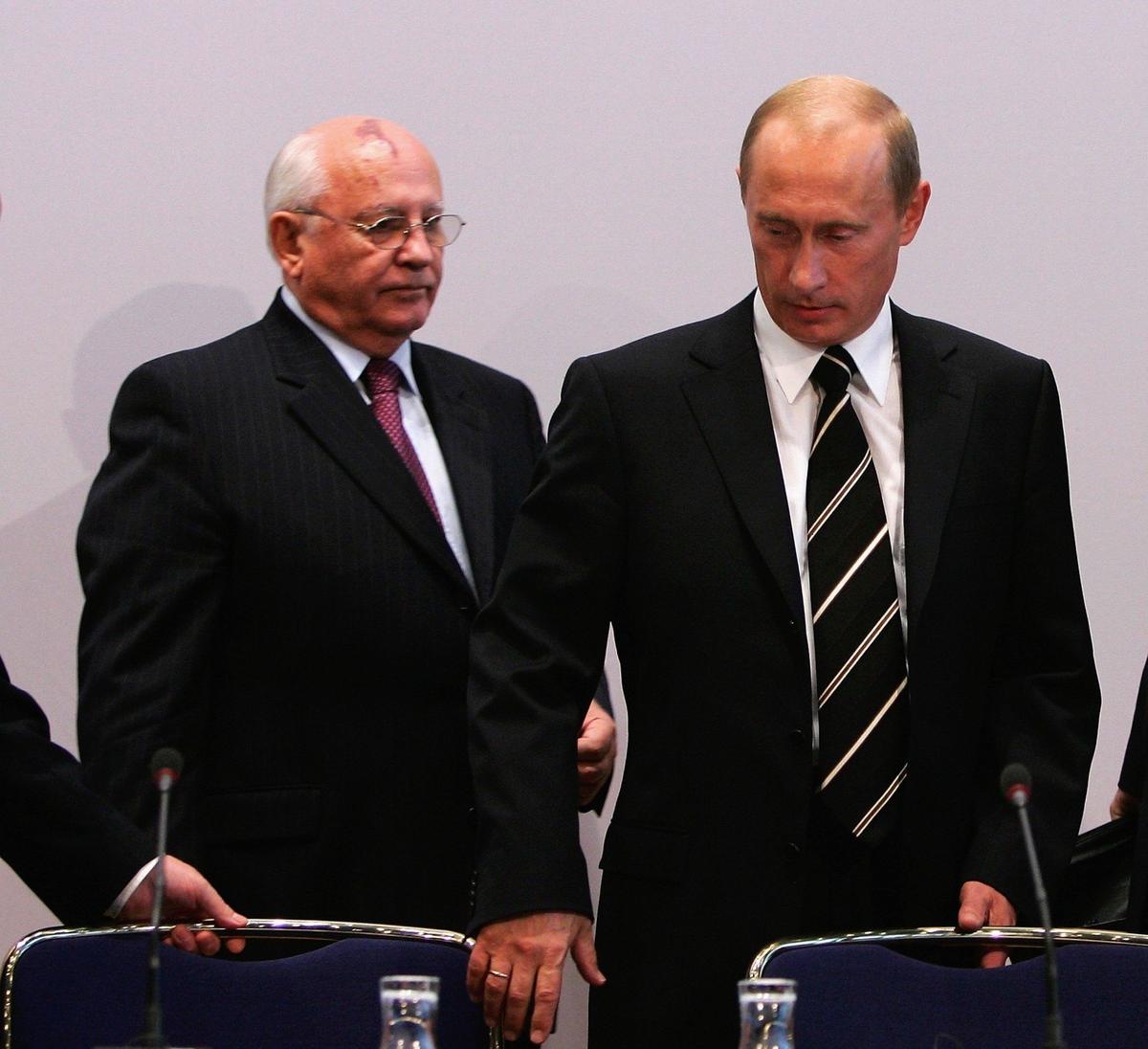
Photo: Andreas Rentz / Getty Images
Putin had a very different trajectory. First, he is a different generation, of course, from Gorbachev. And secondly, yes, Putin had the legal education, but his career was not spent in the party apparatus or the Communist Youth League, but was spent in the security apparatus. The KGB was the state, not the party. And it was less about communism and less about building some type of miraculous future.
It was more about this colossal state inherited from the czars, the biggest state in world history, and defending the interests of that state. Gorbachev, too, was a statist. Gorbachev also admired the great Soviet state and lamented the loss of it, as you know.
But for Gorbachev, it was the party. It was Marxism-Leninism, the belief in a socially just better future than capitalism that motivated him, and Putin had none of this.
Putin is more a descendant of Beria and sort of cynical statism, while Gorbachev is more a descendant of Khrushchev and, in his own mind, of Lenin [not as a real person, but] as a kind of party’s fantasy.
In your book, Armageddon Averted, you wrote that the fall of the Soviet Union could be avoided and before the Perestroika the state was “lethargically stable” and could exist for decades more. It was a historical choice of Soviet elites to try to reform the state. It somehow contradicts the popular view and the words of Gorbachev himself that “it was impossible to delay perestroika any longer”. Can you explain this contradiction?
For Gorbachev, the contradiction was that the big gap between communist ideals and Soviet realities was too much to bear. He had lived it his whole life because he had better information than the average Soviet person by being a high-level party official. Also, Gorbachev spent many months travelling in the West, driving with his wife Raisa through Italy and France, for example, in their Soviet car.
And so he knew some realities that many people didn’t know. And it bothered him deeply. So he felt an urgency that the rest of the population didn’t necessarily feel. The rest of the population was unsatisfied, of course. We were all there in the Soviet Union before Gorbachev, and we know the feeling of the population. But there wasn’t a sense of urgency to recreate the system, to live up to its ideals.
That came from the ideologues, from the Communists, true believers like Gorbachev, and many people in his generation. What was interesting was that Gorbachev was actually part of a coalition of hardliners. When reform happens in Russia — this has been true historically for a long time — the security apparatus, the so-called siloviki, these people fear that because of the hardening of the regime, it’s not the gap between communist ideals and Soviet realities, but the gap between state power in Russia and state power in the West, that is too great. That Russia is falling farther and farther behind the West in terms of economy, technology, advanced weapons systems, military dynamism and economic dynamism. And so for them, it was urgent because the West was gaining and the Soviet Union was falling farther and farther behind.
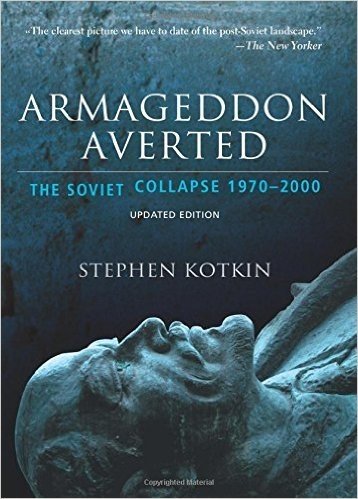
The cover of Kotkin's book Armageddon Averted
Gorbachev comes out of the Andropov circle. He doesn’t come directly from Khrushchev. There’s no dissent from some reform wing of the Communist Party. There is dissent from the security men, from the hard men in the KGB, in the military who push forward a reformer not to destroy the system, of course, but to try to manage and maybe close the gap, the widening gap with the West.
They want the transfer controls lifted on the highest end technology, which hurts the Soviet military. And the Soviet military has a dearth. It has an inadequate supply of microelectronics. They’re worried about Ronald Reagan, the strong national security president of the United States, and the entire Western alliance. This is why the Soviet KGB forms fake companies in Germany and elsewhere in order to purchase illegally this prohibited technology. And so Gorbachev is now going to negotiate with the West in their mind, to lift the technology export controls.
You have a coalition of reform, communist ideologists on the one side and statist hardmen on the other side who come together to try to close the gap, whether it’s in ideals or it’s in power. This coalition is very powerful. Ironically, the urgency is both in the communist ideologues and the hard men, but it’s not in the population at large.
That sense of urgency is delivered by Gorbachev when he opens up with his glasnost and people begin to see just how well the West is doing versus how they’re doing, and the sense of urgency spreads to the whole Soviet public.
But before that the dissident movement was small, the nationalist movements were small, the anti Soviet movements were small. And therefore the Soviet Union could have muddled through for quite some time had Gorbachev not launched these unintentionally destabilising reforms.
Long before 1991, you came to the conclusion that “perestroika” would destroy socialism and the Soviet Union itself. Why did you think it was inevitable?
Well, we have historical cases. We have the Hungarian events of 1956 and Imre Nage. We have the Prague Spring of 1968 and Alexander Dubcek. And then, of course, we have the 1980s in the Soviet Union and Mikhail Gorbachev. And in every case, what we see is an attempt at political liberalisation, opening up the political system for what was seen as democracy inside the Communist Party to democratise the communist monopoly.
Every time we saw that, what happened instead was people decided that they didn’t like the monopoly anymore. So freedom for party officials and for people inside the party was taken by other people, including in some cases communists, to advocate for a different party, for other parties, for a different path. And so the communist system had no reform equilibrium. There was no spot at which you could begin political liberalisation. And then it would end in a newly stabilised political system, because opening up, politically liberalising, meant that you enabled people to go beyond the Communist Party.
You can’t be half pregnant and you cannot be half communist. You either have a communist monopoly or you don’t have a communist monopoly. And the problem with political reform was it undermined the communist monopoly. There was no way to keep the monopoly once you opened up the system.
Now, in the economy, you could liberalise and allow some market behaviour. But even in the economy to liberalise, to open up, you threaten the communist political monopoly indirectly because people gained independent sources of wealth and power economically and that had political repercussions.
In 1968, just before the Soviet-led invasion of Czechoslovakia to crush the Prague Spring, Brezhnev said behind closed doors that reform is a counterrevolution, or reform is the end of the communist system. It was a form of suicide or auto-liquidation. It was unintentional. Gorbachev did not intend to destroy communism. Quite the opposite. But when he began to launch this political reform, it produced the same phenomenon in the Soviet Union as in the Prague Spring and as in Hungary in ‘56.
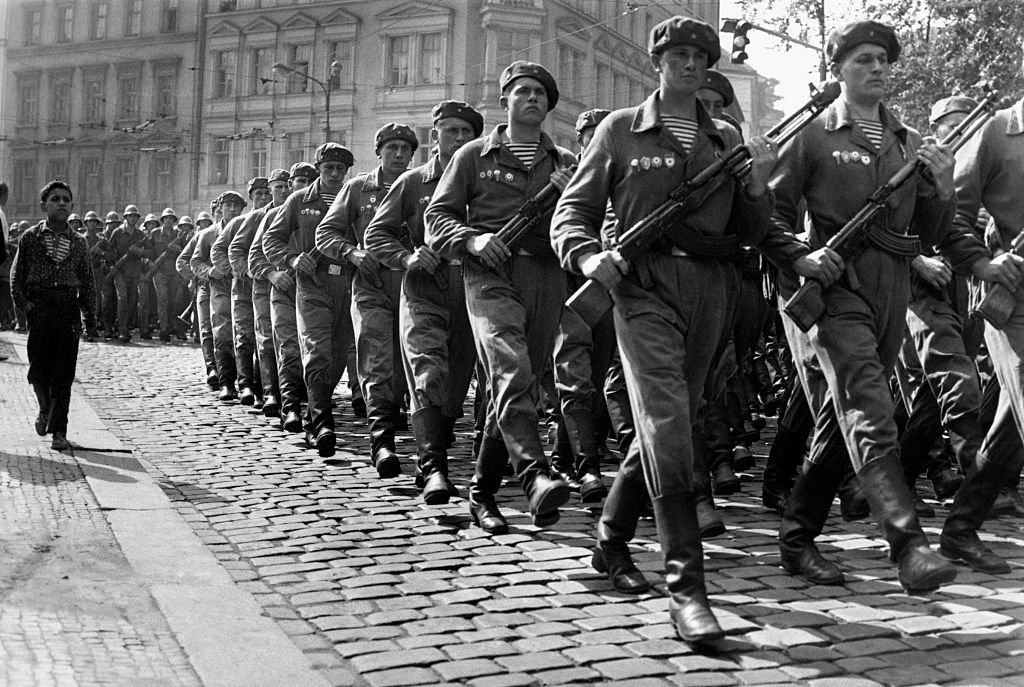
Soviet troops march through Prague in September 1968. Photo: Hulton-Deutsch Collection / CORBIS / Corbis / Getty Images
In those two previous cases, the Soviets had to send in the tanks. This time the Conservatives had to send in the tanks against their own regime, as it were, in their own capital. By the time they got around to doing that in August 1991, it was too late and it was also too incompetent. But so Gorbachev’s decision to open up politically meant that either the Conservatives would force or retreat. They would force a termination of the political liberalisation or the political liberalisation would go too far and you would lose the Communist Party monopoly.
The tragedy for Gorbachev was not just losing the Communist Party monopoly, it was losing the Soviet state. And the reason you lost the Soviet state, in addition, was because the Soviet state was a federation on paper. All the republics were sovereign. The so-called union republics. They had the right to secede from the Constitution. The Constitution allowed them to secede from the union.
But the trick was the Communist Party was only nominally federal. It was actually a hierarchy of pyramids. And the party pyramid overrode state federalism in practice so that the Communist Party of Ukraine or the Communist Party of Georgia or the Communist Party of Lithuania were actually fully subordinated to Moscow in both the party’s statute and party practice. So the party pyramid overrode federalism in practice.
However, if you weakened the party pyramid, if you crushed the party secretariat, because you thought the Conservatives might move against you the way they moved against Khrushchev in 1964, and you weakened the party secretariat and centralised control, you also unintentionally empowered federalism. You empowered the republics at the expense of the Union.
And moreover, Gorbachev gave them competitive elections, which further reinvigorated the republics, governments, their legislatures, and also their publics.
He created not just on paper, but in reality, a federal union with 15 republics that had the right to secede and began to exercise those rights.
And so Gorbachev’s vision for reform and communism undid the communist monopoly. The structure of the Soviet Union was tied completely to the communist monopoly. And so that was a tragedy, fully unintended on his part, that he tried to fix in the very last months of his rule, as you know, in the negotiations, which didn’t pan out. And instead, the presidents of Russia, Belarus and Ukraine formally dissolved the Soviet Union in the woods outside of Minsk. And so you lost not just the party, but the Soviet state. I think that if Gorbachev understood all of this, he would have been much more cautious about his political reforms. He would not have wanted to destabilise the union.
Let’s talk about Gorbachev as a person. His reputation in Russia is at least contradictory — many see him as a naive idealist and a weak leader who ruined the country. It’s a very popular narrative. At the same time, Gorbachev was a talented tactician and a skillful party “apparatchik”. How would you describe his personality?
He’s very tactically agile, very tactically adept. He’s able to manipulate the party nomenklatura. He’s able to manipulate people who seem difficult to govern or manipulate — not always, but in many ways and often.
But the strategy was the problem. Really skillful tactics without a successful strategy don’t lead you anywhere. It’s an empty game. And if your strategy is wrong, it doesn’t matter how good your tactics are. Part of Gorbachev’s tragedy, in my view, was that his tactics were too good so that he was able to complete his reforms, which was a suicide of the Soviet state. Had he been less tactically adept, he would have failed in the reforms in a tactical sense, and either retreated or been overthrown before the end of the Soviet Union.
But the absence of the strategy, what do I mean by that? I mean that his strategy was a mythological one. It was socialism with a human face. It was a reform version of communism, which, as I said, doesn’t exist in reality and in a political equilibrium state. It’s a vision. It’s a fantasy. It’s a mythology. But in reality, it doesn’t work.
That’s what I mean by the lack of a strategy. Once you destabilise the Soviet state, what are you left with? You’re left only with force in the sense of the army and the KGB. That’s it. You don’t have any way to override the empowered Republican legislatures or the Republican people who come out in the streets, the people who vote for the candidate they prefer. Once you empower them, you’re left only with force. So the reform communism ideology is against the mass use of force to hold the system together because that’s Stalinism. And you cannot use Stalinist methods, but you’re left only with Stalinist methods to hold it together. You are tactically very skillful, but you’re strategically empty.
This is a problem not just of Gorbachev. In retrospect, it’s obvious that communist reform was impossible. But honestly, how many people knew that beforehand? Many people believed it was possible, and it was only the conservative resistance that ruined previous attempts at communist reform. That belief was the most widely held view in the West during Gorbachev’s time that if only the Conservatives could be outmanoeuvred, if only the Conservatives could be beaten, Gorbachev could succeed. But in fact it was not about the conservative opposition, but it was about the absence of a reform equilibrium. Very few people understood that, and it took me quite some time to understand that as well.
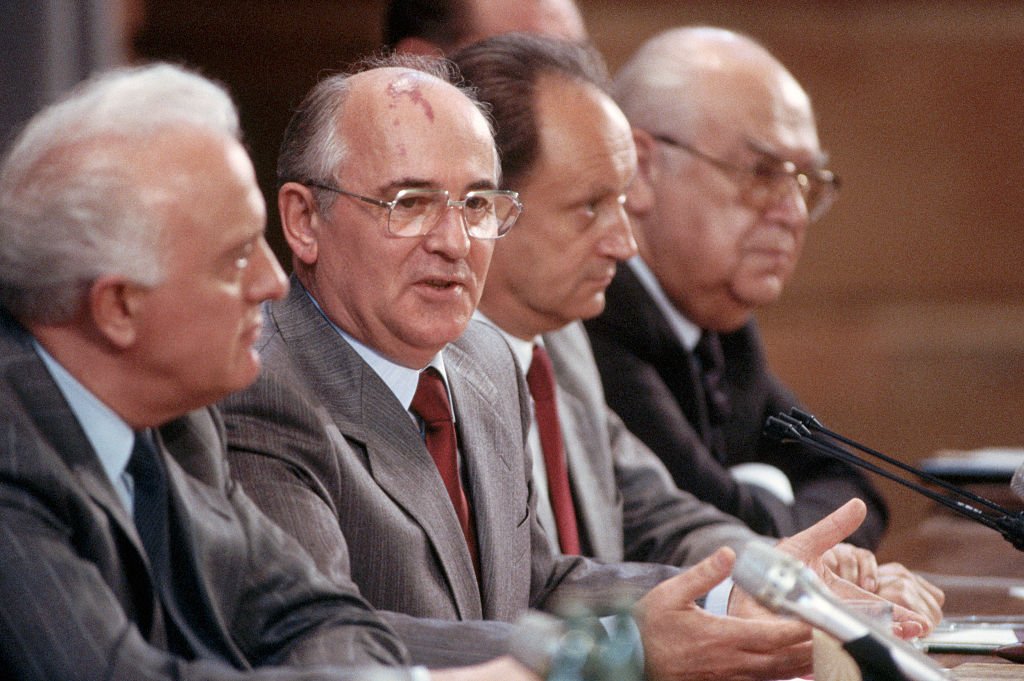
President Mikhail Gorbachev answers questions at a press conference during the visit of U.S. President George Bush, 1985. Photo: Wally McNamee / CORBIS / Corbis / Getty Images
***
Is it fair to say that perestroika was a negative revolution — Gorbachev managed to dismantle the system, but had no clear replacement for it, apart from his utopian vision of humane socialism?
Mikhail Gorbachev won the Nobel Peace Prize, as you know, and he deserved it. He was a man of peace. Remember Soviet propaganda? “We are people of peace”. Remember that nonsense? That Soviet propaganda that nobody believed because the Soviet Union looked so aggressive? It had an empire in Eastern Europe, and an invasion of Afghanistan. And then all they talked about is peace.
It turns out that there was a man of peace — Mikhail Gorbachev. And so it depends where you sit when you call it a negative revolution or a failed revolution. If you sit in Latvia, Lithuania, Estonia, Poland, Hungary, Czechoslovakia, Romania — is it a failed revolution there? In Ukraine — is it a failed revolution in Ukraine or is it a successful revolution? So it depends completely on your point of view. If you sit in Brussels, is it a failed revolution or a successful revolution?
If you sit in Moscow and your name is Vladimir Putin, it’s a failure. In fact, it’s more than a failure. It’s a crime. If you sit in Beijing and your name is Xi Jinping, it’s also a failure and a crime. The Chinese will never forgive the Russians for destroying communism in the Soviet Union. When you talk about strategic partnership between Russia and China, you must remember the anger of the Chinese regime over the destruction of communism in the Soviet Union. The anger is greater or just as great as it was under Mao when Khrushchev denounced Stalin in 1956. Deep, abiding anger.
So from the point of view of seven and a half billion people on the planet, it is an enormous success, deserving of a Nobel Peace Prize. From the point of view of the thin strip of land between Germany and Russia, known as Eastern Europe, it’s a colossally successful revolution for which they are grateful, even if they don’t always admit it.
And let’s remember, is Putin more successful? The problem with Russian power in the world, as you know, is that the aspirations are greater than the capabilities.
Russia wants to be in the first rank of world powers. It wants to be one of the superpowers. In its aspirations, but its capabilities are much less than that. And so it’s constantly struggling against the more powerful West. The West is richer, the West is stronger, the West is more united, and the West is free, which is the source in many ways of the West’s power.
And how does Russia manage its own power against that Western challenge? Gorbachev tried to manage it his way: by reducing the role of the military, by having arms control summits, by trying to re-energise his people and his economy domestically. And in the end, he ruined everything, except he did bring peace. Which is a lot.
Vladimir Putin has spent $1.1 trillion on his economy in 21 years in terms of the military budget. The expense of the Putin regime on the military is unbelievably large. And of course, that money does not go to education, that money does not go to health care, that money does not go to civilian infrastructure. So it’s the opposite of Gorbachev. Gorbachev cut the military, forced the military to downsize and negotiated arms control treaties with the West. Putin has done the exact opposite. And is Russia stronger today as a result? Is the Russian military today more impressive? Or is it showing itself to be incompetent and corrupt as well as criminal on the battlefield? Which is worse — the loss unintentionally of the Soviet state by Mikhail Gorbachev, or the complete loss by Russia of its reputation and its strategic levers of power from its bloated military to its energy superpower status?
So I look at this and I say: failure or success depends on what you measure it against. You could argue that Gorbachev’s attempt at democratisation was not the way to manage the gap between Western power and Russian power. And you can also argue that Putin’s authoritarian regime is doing no better and may be worse at managing the gap with the West. At least under Gorbachev, there were freedoms.
Talking about Gorbachev as a man of peace — today in the post-Soviet republics people discuss a lot the colonial politics of the USSR during the Gorbachev period. We can remember Kazakhstan, Lithuania, Georgia and many other places where peaceful protests were abused. And even in 2014 Gorbachev supported the annexation of Crimea. Should these events affect how we see him today?
Yes, he did do that. That’s part of his historical legacy also. And I don’t think anybody has forgotten it. I don’t think the 5 million, or so, people of the Baltic states will ever let you forget that. Gorbachev did use force in several places and people died. And yes, that’s part of his legacy. And yes, you can’t wish it away.
At the same time, we measure things in scales. Power is relative. Tragedy is relative. Every death is a tragedy. But from those same offices where Gorbachev sat, that same building, the Imperial Senate of Catherine the Great inside the Kremlin, built by the great architect Kazakov — that same building was where Stalin had his office. It was where Beria had his office. It was where millions of people were ordered to their deaths. It was where collectivisation of agriculture was decided, the enslavement of the peasantry, and the deportation of the so-called “kulaks”. It was where the terror was decided and enacted when nearly a million people were executed or died from torture in prisons in just two years.
We know this history, and that history happened in the same building. This is not an excuse for Gorbachev’s behaviour in Georgia and the Baltic states. It can’t be excused. It can only be weighed relative to that other history.
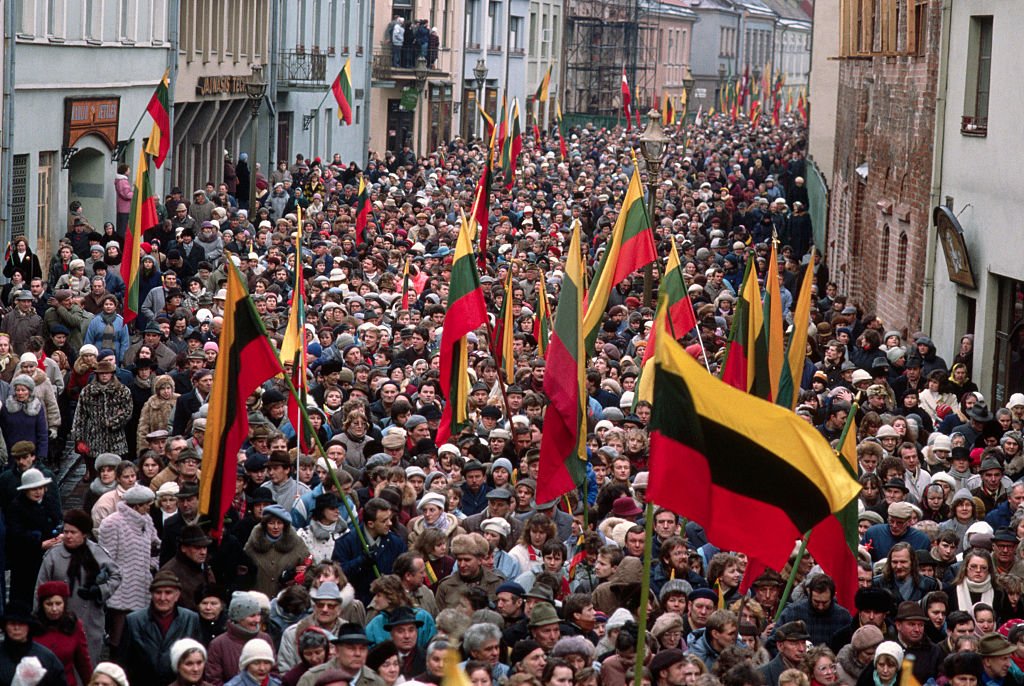
A group of Lithuanians demonstrate for independence from the Soviet Union. 1989. Photo: Peter Turnley / Corbis / VCG / Getty Images
Such was the power, the terrifying power of someone sitting inside the Kremlin. And he did occasionally use that power. And I believe those were mistakes he created — using force. And I believe he needs to own up to those mistakes. But as analysts, we have a duty to weigh the actions of people not only in the abstract, not only compared to Gandhi. We have to compare them to other leaders who sat in that same office or that same building, as well as to the potential tragedies that could have occurred that didn’t occur. And Gorbachev did not destroy the world, but he could have. He had 40,000 nuclear weapons and delivery systems that could put a nuclear weapon right through the window here where I’m sitting. He had chemical weapons. He had biological weapons that the CIA didn’t know about. He could have brought the whole world down with the Soviet state in an act of bitterness, in an act of grievance. He could have wiped the Baltic states from the map completely, even without bringing the whole world down.
And you could argue: well, he would have been crazy to do so. Was it less crazy to invade Ukraine in February 2022? I think there were decisions before and after Gorbachev in that building that made him look a certain way. Without erasing the history that you mentioned. Not an excuse, but a judgement based on history.
You once wrote that the Soviet system was demonised during the Cold War — the Western narrative about the USSR was very black and white. Some intellectuals say similar things now, in the context of the war in Ukraine — that the West hadn’t done enough to integrate Russia, that NATO shouldn’t have expanded, etc. Do you think that our view of the situation should be more nuanced?
Yes, the Soviet Union’s reputation was blackened during the Cold War. I think we have to remember who did that. It was Alexander Solzhenitsyn more than anybody else alive. His “Gulag Archipelago” forever gave an image of the Soviet Union that was the opposite of Soviet propaganda, was the truth, and destroyed the reputation not just of Stalin, but also of Lenin.
Nikolai Leonov, the last chief analyst of the Soviet KGB, complained that the West had a black image of the Soviet Union, but he admitted that the Soviets provided the West with a great deal of material to blacken the Soviet image. Ultimately, it was Stalin and his regime responsible for the black image of the Soviet Union.
Today we have to single out Vladimir Putin as the culprit. Just like Stalin was the culprit. They’re different people. They can’t be put on the same scale. What Stalin did and what Putin is doing is not the same. Stalin, together with Lenin, was responsible for 18 to 20 million deaths. And Putin could never reach a number like that and won’t. Whatever tragedies are still to come from his rule.
Nonetheless, he’s the one responsible for the black and white image. Let’s remember that the Europeans had a strong relationship with Russia before Crimea in 2014. Before the shooting down of the Malaysian airliner, which the Russians denied. And so we need to understand that, yes, the image is potentially too black and white, but the culprit for that is not the Western propaganda. It’s the actions of the Putin regime in Moscow. It’s the Putin regime that has provoked Sweden to join NATO. I never thought I would use that sentence: Sweden could join NATO.
It’s the Putin regime that is driving the most intelligent, educated entrepreneurial people of the country into exile. Putting them in jail or forcing them out of the country. Hundreds of thousands of people recently, as you know, adding to the many before them. There’s a Russian middle class outside Russia involuntarily, which is as big or even larger than the Russian middle class inside Russia today.
It’s Putin who is destroying Russia’s reputation with its friends and allies, with its partners, with its own people. And it’s a strategy that, as I said, it’s empty because it’s not enhancing Russian power from the point of view of the hard men — the siloviki. And so, yes, I regret that it’s come to this. And yes, I regret that the image is so black of Russia today. And yes, it’s wrong to accuse all Russians of complicity in Putin’s war and to or to punish all Russians together for this aggression. But nonetheless, we have to remember where the blackening is coming from.
There is a point of view that one of the lessons of perestroika that Putin and his crew learned is that any ideology is dangerous. What do you think about the ideological power of the current Kremlin? Are there any ideas behind “the Russian world” or is it just an empty concept?
It’s resentment. It’s anger. It’s bitterness. Dressed up with Alexander Dugin and geopolitical nonsense with Ivan Ilyin and religious philosophical trappings. It’s expediency. It’s incoherence. It’s the lack of a strategy. Pan-Slavism, Slavophilism, Eurasianism. It’s all a pretence. It’s not real for the Putin regime.
All they have is anti-Westernism. Anti-Westernism as the deepest and most abiding driver of this bitterness and resentment. “The West cannot be trusted”. “The West betrayed Russia”. “The West is out to destroy Russia the way it destroyed the Soviet Union”. Never mind that George Bush tried to save the Soviet Union and it was three Soviet nomenklatura officials from Russia, Belarus and Ukraine who dissolved the Soviet Union, as well as Mikhail Gorbachev, the general secretary, who destabilised it in the first place.
The anti-Westernism is the ideology of the Putin regime. It’s a weak ideology. As I said, it’s incoherent and expedient and it has its limits with the populace because Russia, even though it’s not Western — is European. Russia is a European country. Europe is a culture.
The West is a set of institutions and values, democracy, rule of law, free and open markets, separation of powers. The West is an institutional setup. Japan is Western, but not European. Russia is European, but not Western.
But the fact that Russia is European means that there’s a limit on anti-Westernism. It looks powerful in the short term to rally the population with stories of Western betrayal, with stories of Western conspiracy directed at Russia. But in fact, over the longer term, it’s going to show its limits, and it’s already showing its limits.
Russian officials do not want a holiday in Pyongyang. They do not want to send their children to school in Harbin. They do not want to hide their stolen assets in Tehran. Russian officials, even the ones who most support the Putin regime, are oriented towards Europe. That’s where they want to holiday. That’s where they want to send their children to school. That’s where they want to keep their stolen assets.
We see the attempt to explain the war in Ukraine. Denazification of Ukraine, the demilitarisation of Ukraine and other lies and nonsense. And they all failed. Those propaganda tropes to explain, to motivate the war, the aggression against Ukraine didn’t work. And now it’s down to protecting Donbas, which Russia has flattened and which is no longer of any value economically, sadly. And it’s also anti-NATO. Anti-West. That’s all he has. That’s all that’s left.
Russia is one of the great civilizations of the world. It has a storied history. Its culture is unbelievable in its richness, in its depth, across all the arts, music and painting and ballet and film architecture. There is no world culture without Russian culture. But Putin is moving Russia farther and farther away from that greatness, from that civilization, from that place that Russia has always occupied in world culture. And he’s doing it in the name of anti-Westernism, when the West has always been the greatest source of Russia’s trade, technology transfer, intellectual influences and relationships.
And so Russia can never recover itself the way it was under the Soviet Union, and it must accept that diminished status. But to burn all bridges to Europe and the West on behalf of a failing strategy is a crime. And it breaks the heart of all of us who love Russia and who deeply respect and admire the culture and the civilization.
But how far are the limits of this ideology? For now, Putin seems to enjoy a certain level of public support, although it’s impossible to measure adequately in a regime of this kind. Some autocrats with even less support can stay in power for a very long time.
He enjoys public support for a war. But that is a mythologised version of the war. He doesn’t enjoy public support for the real war, what’s actually happening. The public is supporting lies that are distributed by propaganda. That’s what they’re supporting. If they were given the truth, if Novaya Gazeta was still operating fully, if this cowardly regime wasn’t using the court system to suppress the truth about the war… Support might still be there because people support their own country. Right or wrong. But would the same levels of support be there?
Let’s remember, that if you look at the scientific studies, the terms, the phrases that are used in the propaganda, demilitarisation, denazification have dropped out almost completely. And now we’re hearing only about NATO, the anti-NATO, the anti-West. I wasn’t suggesting there was no support for the war. I was suggesting that all he has is anti-Westernism, which is not sufficient in the long term as a basis of Russian power in the world, because the West is Russia’s most important relationship. And that’s a historical statement, not a philosophical statement, that’s based upon the study of history and historical cases.
So there is another Russia, there will be another Russia. And even the Putin regime, we have to acknowledge, has done things important for Russia, especially in his first and second term, when the chaos of the Soviet collapse was still there. Putin must get the credit he deserves for ending the unravelling of the Russian state.
And when he came to power, the problem, of course, is always the methods that you use on behalf of those goals. There were worthy goals to stabilise and strengthen the Russian state. Economic development was a worthy goal. Bringing Russia off its knees was a worthy goal. But the methods used in pursuit of those goals ended up putting Russia in the terrible position it is in today.
And so Putin has destroyed in many ways his own legacy, which could have been a positive legacy as a rebuilding of the Russian state and Russian power and Russia’s position in the world. And he can blame NATO’s expansion and say that it’s the West’s fault that he had to murder women and children in Ukraine. He can do that just as Stalin did that in the Cold War. It’s always the West whenever Russia commits crimes, whenever Russia conquers its neighbours, whenever Russia tries to annex territory that doesn’t legally belong to it.
But this is a trajectory. This is behaviour we see that pre-dates the existence of NATO and is derived from Russia’s weakness as a great power in comparison to its aspirations to be the greatest power. That’s the core problem in Russian history. Managing aspirations more in line with capabilities. Accepting the limitations of Russian power in the world. And still being a great country, if not in the first rank of great powers. Because all the efforts to be in the first rank of great powers have only produced tragedy. And the tragedy has been as great, if not greater, for the people of Russia, as well as its neighbours.
And so it hurts to see it repeated again, and it hurts to see the lies and the one sided anti-Westernism. And it hurts to see what’s happening to the people of Ukraine and the infrastructure in Ukraine. It’s heartbreaking to see all this because it’s completely unnecessary. Russia could be a great country without behaving like this. And one day we hope it will be.
Join us in rebuilding Novaya Gazeta Europe
The Russian government has banned independent media. We were forced to leave our country in order to keep doing our job, telling our readers about what is going on Russia, Ukraine and Europe.
We will continue fighting against warfare and dictatorship. We believe that freedom of speech is the most efficient antidote against tyranny. Support us financially to help us fight for peace and freedom.
By clicking the Support button, you agree to the processing of your personal data.
To cancel a regular donation, please write to [email protected]
